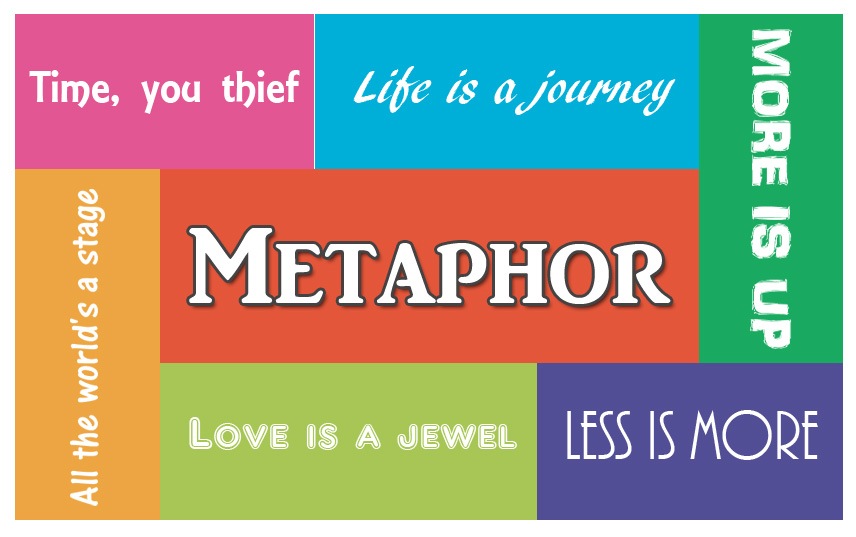Metaphor is also a powerful way of shaping the way we think about things. Advertisers, politicians, newscasters know this. For example, when the US was fighting the First Gulf War, General Schwarzkopf said that a certain attack would be a "Hail Mary pass." Now that metaphor cast the US Armed Forces in the underdog role, and thus elicited more sympathy for the war by the US public. (Or at least that was the goal).
Metaphors force us to think and confront ideas in new and different ways. We use lots of metaphors implying fighting/war when we're talking about cancer, specifically. We fight, we battle, we're survivors, etc. Some studies have shown that these metaphors can have a negative effect on some patients who don't believe they're going to win. The mindset of battle can actually have a negative consequence.
 My personal experience with metaphors came to a head with our new ad campaign at school. I was put off and hit hard by the phrase used: "Custom Fit Learning." Now that shouldn't have been such a hard punch to me, as I'm familiar with the concepts of individualized/differentiated learning and instruction. Somehow, those phrases did not intimidate me as much as "custom fit." That was terrifying and seemed impossible for me. It helped to think carefully about this. Do I want the opposite: "One size fits all" learning? Well, no, I don't like that, either. So after thinking about the metaphor it became clearer to me what the goal of education should be. So I see custom fit as an ongoing process, and thus seems less intimidating. The main point being that it was only when I saw the metaphor, that it got me to think more deeply and clarified what individualized/differentiated was supposed to be about, anyway.
My personal experience with metaphors came to a head with our new ad campaign at school. I was put off and hit hard by the phrase used: "Custom Fit Learning." Now that shouldn't have been such a hard punch to me, as I'm familiar with the concepts of individualized/differentiated learning and instruction. Somehow, those phrases did not intimidate me as much as "custom fit." That was terrifying and seemed impossible for me. It helped to think carefully about this. Do I want the opposite: "One size fits all" learning? Well, no, I don't like that, either. So after thinking about the metaphor it became clearer to me what the goal of education should be. So I see custom fit as an ongoing process, and thus seems less intimidating. The main point being that it was only when I saw the metaphor, that it got me to think more deeply and clarified what individualized/differentiated was supposed to be about, anyway. Metaphor also is used by students who receive a grade. "I got an A." As a teacher, I have thought about "giving the student a grade." The downside is it implies that the student is given the grade and the teacher is giving, which is top-down. The teacher is higher and handing the grade down. It can even imply, at least in many students' thinking that I've noticed, that the student has no control over the grade. I've been thanked for giving a certain grade and I try to explain that it was their work and effort. Now, I'm thinking about a different metaphor for grading. How about "show"? I guess the fancy word is "demonstrated", but I think it easier for students to think of "showing" or "displaying" something. The responsibility then shifts from teacher to student. It also takes some of the stigma off a grade, I think. The student may be a great reader, but write little and talk little about their reading. If we let the metaphor of "show" sink in to the culture at large, the student, and parents hopefully, will understand that low grade in reading is only on what they have "shown" or "displayed." As I say to students often, "I'm not a mind reader. I can only go by what you show me. If you hand me a blank page, well I don't have much of a choice, do I?" I really wonder
Metaphor also is used by students who receive a grade. "I got an A." As a teacher, I have thought about "giving the student a grade." The downside is it implies that the student is given the grade and the teacher is giving, which is top-down. The teacher is higher and handing the grade down. It can even imply, at least in many students' thinking that I've noticed, that the student has no control over the grade. I've been thanked for giving a certain grade and I try to explain that it was their work and effort. Now, I'm thinking about a different metaphor for grading. How about "show"? I guess the fancy word is "demonstrated", but I think it easier for students to think of "showing" or "displaying" something. The responsibility then shifts from teacher to student. It also takes some of the stigma off a grade, I think. The student may be a great reader, but write little and talk little about their reading. If we let the metaphor of "show" sink in to the culture at large, the student, and parents hopefully, will understand that low grade in reading is only on what they have "shown" or "displayed." As I say to students often, "I'm not a mind reader. I can only go by what you show me. If you hand me a blank page, well I don't have much of a choice, do I?" I really wonder how different parents and students would react to a grade if they really thought of it as something "shown" and not "given."
how different parents and students would react to a grade if they really thought of it as something "shown" and not "given."

No comments:
Post a Comment